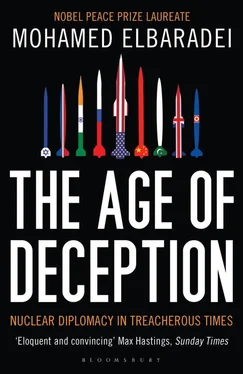In early October 2002, before the vote on the final, reworked resolution, Hans Blix and I were invited to a meeting at the U.S. State Department. Colin Powell was our host. Condoleezza Rice, Paul Wolfowitz, and Lewis Libby [2] Rice at the time was the national security adviser. Wolfowitz was the deputy secretary of defense. Libby was the chief of staff to Vice President Cheney.
rounded out the group. I was just completing my first term as Director General of the IAEA. Blix had come out of retirement to become the executive chairman of the successor organization to UNSCOM, UNMOVIC, which had been somewhat dormant since its creation because of the lack of access to Iraq. UNMOVIC would focus on chemical and biological weapons and missile technology.
The atmosphere was tense. It was obvious that the Americans were in sharp internal disagreement about the best way to proceed. Powell was advocating for the United States to use a typical UN inspection process, while Wolfowitz and other hardliners wanted to sidestep the UN altogether, or like Rice, create a UN cover for what would be, in essence, a United States–directed inspection process. Rice even went so far as to suggest that the person manning intelligence in UNMOVIC should be an American. “We trust our people,” she said. Blix balked, saying that a Canadian had been designated and would be in charge.
It was starting to feel like 1992 all over again.
Their goal in this meeting was to try to persuade us to accept some of the clauses in the draft resolution to which we had taken exception. Blix was blunt, telling Rice that he was not going to act as a “façade” for a U.S. operation. “If you want a U.S.-led operation simply blessed by the UN, you can have [one] modeled after the South Korean operation in the ’50s. [3] The United Nations Command (Korea) of the early 1950s was a command structure that combined military forces from multiple countries, to provide assistance to South Korea in repelling North Korean hostilities. Security Council Resolution 84 recommended that UN member countries contributing troops and other assistance make them “available to a unified command under the United States of America.”
But if you want a UN operation,” he declared, “you cannot have people on the teams that are not under the authority of the heads of the inspecting organizations.”
Rice was unambiguous in her views of the UN system. At one point in the meeting, Blix stressed the need for the draft resolution to conform to UN standards and for the inspections to be perceived as a “legitimate” UN operation. Rice’s retort was sharp. “Mr. Blix,” she announced, “the UN Charter is based on the primary role and responsibility of the five permanent members of the Security Council. As you are aware, the security of the United States is threatened, and it is therefore free to take whatever measures necessary to protect its security.” I found myself feeling grateful that she had stopped short of saying that the United Nations is the Security Council, and the Security Council is the United States. [4] An underlying viewpoint was reappearing here: certain political factions in the United States have often viewed the United Nations as merely a tool, to be used when convenient, as a way to make U.S.-driven actions more palatable to other countries, but to be discarded or circumvented when UN objectives are not in U.S. interests. These individuals or groups tend not to view the United States as one UN member among many—nor really as a member of the community of nations—but rather as a sort of patron or custodian of the UN, exempt from the rules it helps set for others. This viewpoint was perhaps most strongly in evidence during the George W. Bush administration.
Wolfowitz appeared indignant that he even had to be present. He was stiff and disinterested; his body language indicated that the meeting—and perhaps the whole notion of involving the United Nations—was a waste of time. When he finally spoke up, his tone was condescending. “Mr. Blix,” he announced, leaning across the table, “you do know that these Iraqis have weapons of mass destruction?”
The group discussion stuttered on but proved inconclusive. Frustrated, Powell and Rice took Blix and me aside to an antechamber. “You should not feel the burden of the implications of your inspection reports,” Powell told us, “because any decision to use force will be made by heads of state, and not by you.” Powell may have meant to be reassuring, but in the context it came across as patronizing.
In the end, we managed to dissuade them from some of the more belligerent proposals. But they were insistent on one measure: the need to interview Iraqi scientists outside of Iraq, taking their families with them to avoid retribution by Saddam Hussein’s regime. We tried to spell out the problems with this clause. I tried to explain the cultural nuances of “extended family” in the Middle East. Why, I asked, were they so certain that an Iraqi scientist would want to leave his or her country and never return, in order to benefit the United States or the West? How could the United Nations ensure that scientists who agreed to leave would not be threatened or even killed before their departure? What could we do to prevent the scientists’ extended families from being harmed as a result?
Nothing we said made a difference. The Americans didn’t really listen to these human rights considerations. They were convinced that interviewing scientists outside Iraq was a great idea; they said they could not change the measure anyway, because it had been approved “at the highest level” of the U.S. government. The clause stayed in the resolution (although, in the months that followed, not once was this provision put to use).
A few weeks later, with negotiations on the resolution still under way, Blix and I were called to a short courtesy meeting at the White House. On our way to meet President Bush, we had our first encounter with Vice President Dick Cheney. It was brief; Cheney was sitting behind his desk. Cheney wasted no time on small talk; he had a direct, simple message to convey. “The U.S. is ready to work with the United Nations inspectors,” he told us, “but we are also ready to discredit the inspections in order to disarm Iraq.”
Having received this warning, we proceeded to our meeting with Bush. Other than Condoleezza Rice and Bush’s chief of staff, Blix and I were the only audience. In what was more or less a monologue, Bush got right to the point. He asserted that he was in favor of using inspections to address Iraq’s WMD issues, that he would prefer a peaceful resolution of the international concerns about Saddam Hussein’s regime. “I’m not a trigger-happy Texas cowboy, with six-guns,” he quipped, sliding forward on his armchair, hands on his hips, to show us how a cowboy would pull out his pistols. On the other hand, he countered, if peaceful approaches were unsuccessful, he would not hesitate to lead a “coalition of the willing,” using military force. It was an odd interaction: Bush kept repeating that it was an “honor” for him to meet with us, but he was not the least bit interested in anything we might have had to say. Together with our exchange with Cheney, the encounter told us clearly that the U.S. administration viewed us as bit players in an operation they intended to control.
Still, when Resolution 1441 was adopted, one week later, the United States made one last concession. The Americans had wanted the resolution to authorize the automatic use of force if Iraq were considered to be in material breach of its obligations. To many members of the Security Council, this was unacceptable. The P-5—primarily the French, Russians, and Americans—worked out a compromise. The final version merely said that if Iraq was found in material breach, the council would “look into” the next steps to be taken.
Читать дальше












